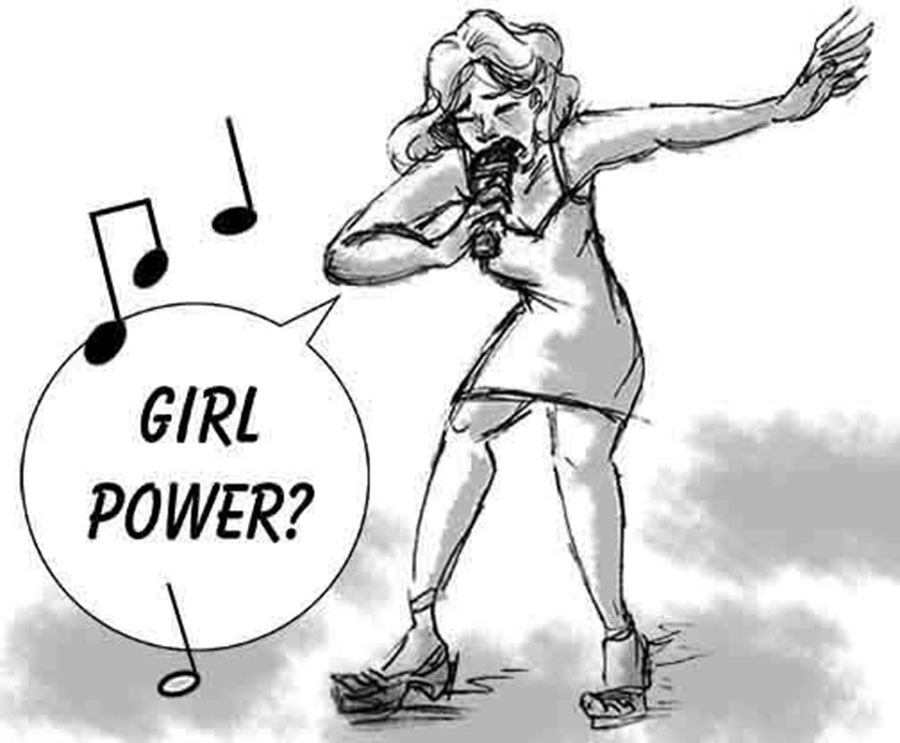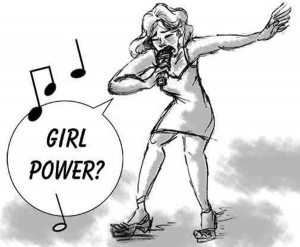Billboard’s all-female Top 5 don’t empower
For a record-breaking six consecutive weeks, female artists have snagged the top five spots on the Billboard Hot 100 chart. Performers such as Meghan Trainor and Iggy Azalea seem to have collaboratively taken over an arena that had been ruled by the likes of Justin Timberlake and Eminem for many years. The Daily Mail and Billboard have deemed this milestone a new era for “girl power,” but further examination of some of these popular lyrics suggests that the female-empowerment stamp of approval should not come so easily.
Fittingly for this column, the term “girl power” was popularized by a music act. According to National Geographic, the term is commonly associated with the ’90s pop girl group, the Spice Girls. Serving as role models for young girls, the quintet inspired loyalty and sisterhood. Through their construction of a supportive community in “Wannabe,” the Spice Girls highlighted a “sisters before misters” commandment. In “2 Become 1,” the five crooned about making smart choices, educating their listeners to create a safe haven and to openly discuss their relationship issues. Their messages added to the foundation of feminism in promoting individuality and strength.
But it seems that, as of late, many have forgotten the actual meaning behind girl power. It is not a loose assembly of women, known for their accolades with little personal association — this depreciates the unity. It is not about female artists who find it necessary to sexualize their musical words, both in song and music video form.
Take Tove Lo’s “Habits,” for example. In the chorus, the singer belts out, “You’re gone and I gotta stay / High all the time / To keep you off my mind.” Her words illustrate a parasitic dependence on someone else, denoting a divergence from the aforementioned empowered mentality. “Bang Bang” with Jessie J, Ariana Grande and Nicki Minaj, on the other hand, is infused with graphic content and irreverence to the female body. Jessie J starts off with, “She got a body like an hourglass, but I can give it to you all the time / She got a booty like a Cadillac, but I can send you into overdrive.” These words diminish women to nothing more than sexual objects. As kick-ass as the title makes it seem, even “Black Widow” by Iggy Azalea ft. Rita Ora paints an unflattering and untrue picture of women. Midway through the song, Azalea sings, “I’m gonna love you until it hurts / Just to get you I’m doing whatever works,” insinuating that all women, when jealous, become obsessive and crazed.
Girl power is not as casual as listing another involvement on a resume or liking a page on Facebook. It is a concept deeply rooted in feminism and equality, so earning the recognition requires effort and unwavering support for the cause — that is, what ingrains unity between women. So while Trainor’s “All About That Bass” might be a celebration of bodies of all different types, the artist, according to the Huffington Post, does not consider herself a feminist. Characterizing Trainor as the poster child for the strength in the female population would be futile because she renounces the fundamental aspects of girl power.
In reality, instead of parading these performers as revolutionary agents in the music scene, we should look at other artists that have been revolutionizing the landscape for quite some time already. Artists like Pink and Lorde openly challenge the norm, inviting others to question politics or social issues in general. Girl power should also include men as well. The Beastie Boys, according to LA Weekly, have been known for their feminist sympathies, captured best in the song “Sure Shot”: “I want to say a little something that’s long overdue / The disrespect to women has got to be through / To all the mothers and the sisters and the wives and friends / I want to offer my love and respect to the end.”
It goes without saying that it would be a bit far-fetched to expect female performers to be Gloria Steinem with back-up singers and a sound stage. But instead of applauding wannabe girl power enthusiasts, we as a society first need to clearly define the elements of feminism to truly progress.
Danni Wang is a sophomore majoring in psychology. Her column, “Pop Fiction,” runs Mondays.



What’re YOU complaining about? Feminism . . . you don’t think women should get equal pay for equal work, equality in the courts, or have the right to vote ??? (Hope I’m wrong about you on that . . . but it’s amazing how many don’t know the meaning of the word.) Yes, if you don’t believe in fairness and equality, I can see where you’d hate it if someone makes a valid point in favor of it. But for those that do . . . well . . . there’s still a lot to discuss as we all (hopefully you included) strive for progress on that front.